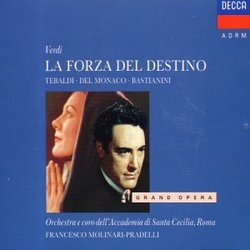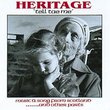| All Artists: Giuseppe Verdi, Francesco Molinari-Pradelli, Accademia di Santa Cecilia Orchestra, Cesare Siepi, Ettore Bastianini, Ezio Giordano, Fernando Corena, Giulietta Simionato, Mario del Monaco, Piero de Palma, Renata Tebaldi, Silvio Maionica Title: Verdi: La Forza del Destino Members Wishing: 0 Total Copies: 0 Label: Decca Release Date: 9/10/2002 Album Type: Box set, Original recording reissued Genre: Classical Style: Opera & Classical Vocal Number of Discs: 3 SwapaCD Credits: 3 UPC: 028942159822 |
Search - Giuseppe Verdi, Francesco Molinari-Pradelli, Accademia di Santa Cecilia Orchestra :: Verdi: La Forza del Destino
 | Giuseppe Verdi, Francesco Molinari-Pradelli, Accademia di Santa Cecilia Orchestra Verdi: La Forza del Destino Genre: Classical |
Larger Image |
CD DetailsSimilar CDs |
CD ReviewsPower, Drama, Beauty! My No1 Forza Del Destino! Armindo | Greece | 01/28/2003 (5 out of 5 stars) "After the legendary Florence Festival Forza performances (1953) under the baton of the neglected giant Dimitri Mitropoulos, people at Decca knew they had the perfect artists to create a masterful Forza Del Destino. This set gives us an idea of the kind of voices one could hear in the '50s: Tebaldi, Del Monaco, Bastianini, Simionato, Siepi, Corena. Everyone was at her/his peak in 1955 when this set was recorded. Notice also that they are all Italians and this certainly is a plus when it comes to vibrato and Italian accent. There are not enough superlatives to compliment Renata Tebaldi's Leonora di Vargas. Even her opponents agree that this was one of her greatest roles in which she was unrivalled. The sheer power and clarity of her singing teaches us how opera is supposed to sound! Verdi (and all opera composers) has injected the drama in the music but you need an opera singer of this calibre to sing the drama. Just listen to "Son giunta!", "Pace, Pace" or any other Tebaldi moment!Del Monaco is heard here in one of his famous roles. He rarely sings piano on this set but his fierce sound is welcome in this heavy tenor role. He lacks Bergonzi's style but on the other hand, Bergonzi doesn't have Del Monaco's ringing voice. Giulietta Simionato once again proves that she was an excellent Verdi mezzo. As for Bastianini, Siepi and Corena they are everything one could ask for. NO OTHER Forza Del Destino recording has such an ideal group of performers!Mollinari-Pradelli was not the best conductor of his time but I find his conducting very pleasant; he doesn't try to overpower his singers and allows them to shine. A Serafin or a Mitropoulos would have been ideal but still the result is excellent. And what a great surprise that this '55 set has STEREO sound! The only other studio Forza Del Destino I warmly recommend is the EMI Gardelli set with Bergonzi, Arroyo, Capuccilli and Raimondi: a less powerful performance with great singing (if not as enchanting as the one heard here). If you are looking for Verdi perfection go for the '53 live Florence Festival Forza Del Destino (Tebaldi, Del Monaco, Barbieri, Protti - Mitropoulos) or get the 1958 DVD Forza with Tebaldi and Corelli." Magnificent and authentic Forza Marc Musnick | 01/30/2005 (5 out of 5 stars) "This magnificent set which comprises of four Italian principles is the best recorded FORZA available. Although the competition is pretty stiff when this opera was not difficult to cast, I always come back to this recording. And if you love Tebaldi, this recording is a must have." Top notch, Golden-Age cast in ideal Verdi performance; one o Niel Rishoi | Ann Arbor, MI USA | 03/11/2007 (5 out of 5 stars) "If I had to name a favorite Verdi opera, it would have to
be his La forza del destino. This opera moves me like no other among his works. I realize that some others - Falstaff, Don Carlo, Otello - are considered to have a greater unity between text and music. But Forza has the strongest emotional pull. The story may be pure opera-illogico of the soap variety, but the emotions expressed within the dilemmas of the characters are powerful, moving. It is among the gloomiest of Verdi's operas, tense, brooding, morbid. Classic themes of thwarted love and revenge. But there's also spirit, quirkiness (Preziosilla, Melitone), and perhaps most significantly for me, profound spirituality. The second scene in the second act is one of the most inspired from Verdi, one I go back to with eager familiarity. The "Madre, Madre pietosa Vergine" is a peerless expression of pleading for mercy and devotional fervor, with the monks' backing chorus creating a truly haunting effect. Nothing is more beautiful than that section beginning "Ah! que'sublimi cantici..." (and we are treated again later to the equally ravishing "La Vergine degli angeli"). The long duet with Guardiano and Leonora is an amazing piece of writing, one of the best musical "dialogues" for soprano and bass; usually these "father/child" duets are boring, but this scene, imaginative, urgent and detailed, is powerful drama. One passage I love in this is the prelude to "Il santo nome di Dio signore," where there is a long solo for organ; it achieves pure magic with a lone violin, on high, intoning the "Deh, non m'abbandonar" melody. The contrast between the organ and violin produces an ethereal, eerie effect. This is by far some of the most raptly spiritual music Verdi ever wrote. And, of course, there's "Pace, pace mio Dio." Abetting my enjoyment of the opera is the mid-fifties recording of it put out by Decca/London, conducted by Francesco Molinari-Pradelli. It may not be the most "of the theater" performance of the opera, but it is one of the greatest overall casts ever assembled on a Verdi recording. At any time. At least I think so. Here's who we get: Renata Tebaldi, Giulietta Simoonato, Mario del Monaco, Ettore Bastianini, Cesare Siepi and Fernando Corena. All huge voices, all healthy, robust; true Verdi voices, stylists. All in their resplendent prime. All ITALIAN. Nothing else like that for ages. And ages. In my estimation, Leonora was Tebaldi's best Verdi role, and perhaps the best Leonora of the last several decades. The voice and manner sound so ineffably, authentically "right." Don't tell me she's under the pitch in some of the highest notes: IT DOESN'T MATTER. Pedigreed Verdi singing of this nature is extinct. The full-bodied softness, the exquisite diction, the comet-like soaring - it doesn't get better than this. Her "Madre, madre pietosa Vergine" is one I listen to the most. The rhythmic urgency, the fullness of tone - and she sounds as if she's really talking to God. And I feel; only a devout Roman Catholic could possibly understand the religious piety of Leonora, and it's especially important here. With Verdi and Tebaldi, you Believe. You better believe it. Hearing del Monaco and Bastianini just effortlessly plunge their hearts and voices in their music and duets is the sweetest sound to my ears: they fence as only Italian uomini can do, and moreover, exhibit not a whiff of stress doing so. Immense, powerful sounds. Bastianini's "Urna fatale" is close to being my favorite rendition of the aria; there is a beautifully imparted bittersweetness to the voice, a smarting irony that goes right to the heart. Del Monaco is not all just his usual glorious fire and brass; "O, tu che in seno agli angeli" has as much sensitivity as you could want - and are going to get - from a "confident" Italian tenor. Simionato rips through an ungrateful killer of a role with utter nonchalance and great spirit; "Al suon del tamburo" and "Rataplan"are both a bitch of pieces to sing, requiring the mezzo to skip up and down nimbly, but Simionato just laughs merrily through it all. She makes it sound like a piece of cake. Siepi delivers the best sung Guardiano of any on record that I know of. So many magical sections come to mind immediately: "Venite fidente alla croce...", "Sull'alba il piede all'eremo", "Il santo nome di Dio signore", "Non imprecare umiliati" ~~ no other Guardiano has a voice so beautifully resonant, so well placed, and such consummate ease with this complex music. So many basses rumble portentously through this music so that they sound like gassy, juddering old farts, but Siepi just caresses the ear constantly, and not just with the sound. He traverses easily through the difficult writing; listen to how he manages in the final trio the line `d'ira e furor sacrilego, non proferir parola; vedi, vedi quest'angiol vola al trono del Signor.' This section zips up and down the voice's range, and requires supreme breath control, and security at either ends of the range. Most basses are gasping for leverage here, but not Siepi. In fact, he sings this role with such ease, he's often accused of sounding uninvolved. Ha. Listen to the way he and Corena, in their long and legendary partnership, spark each other in the duet with Melitone and Guardiano. Others versions I like: the rediscovered 1958 Napoli performance on video (but Christoff is an unidiomatic major blot for me). Tebaldi even greater. The young Corelli. Bastianini. Oralia Dominguez. A priceless document. (Leontyne is in the 1984 MET performance). The 1953 Mitropoulos from Firenze. Tebaldi ferociously intense. Siepi again great. Protti so-so. Barbieri, Barbieri. Del monaco more sensitive than on Decca. Mitropoulos - slow tempi, but dramatic. " |


